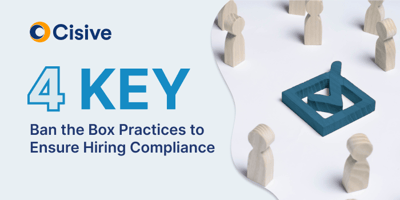

Finding the right candidate for a new job opening is no easy feat. Between analyzing résumés and...

Automatically disqualifying candidates with a criminal record can unfairly impact a qualified applicant’s opportunity for employment. Fair chance hiring presents a more thoughtful approach to using background screening information when making hiring decisions. By focusing on individualized assessments of risk rather than blanket exclusions, fair chance hiring practices promote equal employment opportunities for everyone.
Nearly all employers (94%) with locations in the United States use data from a criminal background check when extending job offers, research from the Professional Background Screening Association (PBSA) shows. Employers are responsible for evaluating the information uncovered during a background screening on a case-by-case basis to determine the level of risk presented by hiring someone with a criminal past.
That’s a task that requires nuance, says Michael Kendrick, senior compliance officer at Cisive. “It’s not good for any company to have blanket swaths of internal regulations that say, ‘We want to not have any kind of criminals working here,’” he says. “There are different levels to criminal convictions, and they are not all equal. Just like there is diversity in our population, there is also diversity in risk.”
Find out how fair chance hiring promotes a more thoughtful approach when using background screening information during the hiring process.
Fair chance hiring stems from a series of fair chance laws that aim to address biases in traditional hiring practices that exclude candidates with criminal histories. At its core, this approach evaluates candidates based on their qualifications and potential rather than their past mistakes. This method creates a balanced and fair screening process for job applicants.
Most fair chance laws are more formal codifications of the EEOC Enforcement Guidance on the Consideration of Arrest and Conviction Records in Employment Decisions, issued in 2012. So it is no coincidence that many of the fundamental requirements are reflected in both.
Ban the Box laws, which originated in Hawaii, mostly focus on the front-end processes of employers, prohibiting employers from asking about criminal histories on job applications. The principle is to move the question of criminal history to a later stage in the hiring process, typically after an offer of employment has been made.
This ensures candidates are considered based on their skills and experience before any criminal background checks are conducted. “[Often,] companies would only pull applicants from the ‘no’ pile, without any further investigation or evaluation as to what that ‘yes’ answer may have actually meant,” Michael says. “Ban the Box sought to mitigate that by saying to employers that you can’t solely make a decision based on the answer to a click box question.”
Second Chance laws are another approach that some law makers are using to reform the criminal justice system’s impact on the lives of millions of Americans with past convictions. Many experts now agree that not all conviction records should indefinitely hinder someone’s ability to reintegrate into society and contribute positively. “Many states have put those laws into place or combined them with fair chance to say, ‘Alright, if we cannot achieve a proper balance in how criminal information is evaluated, regarding the consideration of ”risk” in employment or housing decisions, we will wipe out the conviction entirely through expungements or place time limits on the reportability of the criminal record information,’” Michael says. “In some cases, the courts have expanded the use of several types of sentencing remedies and outcomes like ‘deferred adjudications’ leading to or leaving the door open to future expungements or sealing of certain criminal records.”

Implementing fair chance hiring practices brings many benefits that can improve how businesses find and keep talented employees. By removing unfair or even irrelevant barriers for people with past criminal records, companies can access a wider range of skilled candidates. This approach leads to a fairer hiring process and can result in better employee loyalty, higher productivity, and more innovation.
Fair chance hiring practices allow you to tap into a broader range of candidates. Many individuals with past convictions have valuable skills and experiences. The majority of HR professionals and business leaders surveyed by SHRM and the Charles Koch Institute report that workers with criminal records perform just as well as or better than their peers without records. By removing initial barriers, you can discover talented candidates who might otherwise have been overlooked.
Employees given a second chance for employment following a conviction often demonstrate high levels of loyalty and commitment. Academic research shows that employees with criminal records have longer tenure and are less likely to leave an organization voluntarily than their peers without records.
Implementing fair chance hiring can reduce costs associated with extensive background checks and high employee turnover. Simply discounting anyone with a record means that you need to cast a much wider net to find applicants. “It’s causing more expense when you apply screening policies that way,” Michael says. “You have to look harder. You have to spend more money on screening. Looking at it from a practical ‘risk-based’ standpoint will always give you better results.”
A balanced evaluation process that realistically evaluates the risk posed by a candidate means avoiding the expenses of repeatedly screening and disqualifying large numbers of applicants, which could lead to unintentional discriminatory actions.
While not the primary focus, improved DEI outcomes can be a benefit of fair chance hiring. A survey of research conducted by the Thurgood Marshall Institute suggests that automatically disqualifying candidates with a criminal record could negatively and unfairly affect Black applicants. Some causes include underlying systemic biases within the criminal justice system and negative stereotypes and assumptions from hiring managers.
“But even beyond the typical human traits that often come to mind when we speak about discrimination,” Michael says, “systemic biases baked in our laws and within the criminal justice system have had a devastating impact on the most marginalized populations, people that are often already economically challenged. Essentially creating a societal vacuum that, for some, is impossible to escape.”
By removing discriminatory barriers, you can foster a more inclusive workplace. Ultimately, fair chance hiring supports a more diverse range of perspectives and ideas, enhancing innovation and problem-solving. “If we do this the right way, DEI can be a natural component that’s baked into it because you’re setting a more level playing field for applicants to compete,” Michael says.

Adopting best practices for fair chance hiring can greatly enhance how businesses attract and retain talent. By following these guidelines, companies can ensure a more equitable and effective hiring process. This not only opens doors to a wider pool of qualified candidates but also fosters a work environment that drives better performance and growth.
Understand that not all criminal records equal the same risk. Evaluate the relevance of a candidate’s past offenses to the job in question. “I think it’s good that we are moving away from that old standard of 10-20 years ago, where the HR person said, ‘We just don’t hire anybody that has any kind of blemish,’” Michael says. “We need to look at what it is to determine how it’s a risk.”
For example, a decades-old minor offense may have no bearing on a candidate’s ability to perform well in a specific role. This nuanced approach allows for a fair assessment of the candidate’s true potential.
Criminal background checks are more relevant in certain roles and industries than in others. People with specific criminal offenses are excluded from taking patient-facing roles in healthcare, for example. The Office of the Inspector General has a list of people who are not allowed to work in certain jobs. If you hire people on this list for those jobs, they could put patients and your organization’s compliance at risk.
For each role in your organization, develop a list of disqualifiers to help you weigh the risks of hiring someone on a case-by-case basis. “The more HR focuses on what those details are and is knowledgeable about the jobs they’re hiring for,” Michael says, “the greater ability they’ll have in their efforts to meet requirements imposed by fair chance laws.”
Shift from a punitive stance to one that considers the overall candidate. Evaluate their skills, experiences, and the context of their criminal record. By getting to know each candidate as a person first, you can minimize the likelihood of hiring managers automatically reacting negatively to a criminal record.
“Remember,” Michael says, “it's the courts responsibility to try cases and impose sentencing for crimes as defined by the laws of our society. In the United States, the criminal justice system (under most circumstances) is intentionally designed to be both punitive and restorative. While some criminal convictions rightfully carry a ‘lifetime’ sentence, however, not everyone convicted of a crime should pay for it for their lifetime.”
This holistic approach ensures that candidates are judged based on their qualifications and potential, rather than being disqualified due to past mistakes.
A fair chance hiring strategy can help reduce unnecessary costs associated with high turnover and extensive background checks. By adopting a balanced approach, you can avoid the expenses of repeated screening and disqualifying large numbers of applicants, leading to a more efficient hiring process.

Implementing fair chance hiring can present several challenges that businesses need to navigate carefully. These obstacles can complicate the hiring process and require thoughtful strategies to overcome. Addressing these challenges is crucial for creating a fair and effective hiring practice that benefits both employers and candidates.
With over 90,000 municipalities, and other local governments in the United States, all capable of passing their own fair chance laws, multi-state employers face the challenge of navigating a complex web of local regulations. This can make it difficult to maintain consistent hiring practices across different locations.
Keeping up with the ever-changing landscape of local fair chance laws is a significant challenge. You must stay informed about specific regulations in each jurisdiction where you engage in hiring activities to ensure compliance and avoid potential legal issues.
Effectively integrating local fair chance laws into existing hiring practices requires careful planning and adaptation. Ensuring that your policies and procedures are aligned with local regulations can be resource-intensive and complex.
While partnering with Consumer Reporting Agencies (CRAs) can be a valuable aid in managing compliance by providing relevant information, ensuring appropriate background checks, and offering support tools that can assist employers with workflows and processes. Ban the Box and Fair Chance laws are constructed to regulate how and when employers use criminal information, you are ultimately responsible for using the information to make fair hiring decisions. It is crucial to understand and apply fair chance laws correctly, rather than relying solely on CRAs to ensure compliance.
As an HR leader, you have the power to drive meaningful change and create a more diverse, equitable, and inclusive workplace. By embracing fair chance hiring as part of your strategy, you can open the door to a wider pool of qualified candidates, remove unnecessary barriers to employment, and ultimately build a stronger, more resilient organization. It's time to move beyond outdated, one-size-fits-all policies and embrace a more thoughtful, individualized approach to background checks and criminal history screening. Your employees, your organization, and your community will all benefit.
Want to learn more about Cisive’s background screening solutions and support? Schedule a call with one of our background screening experts.
Author: Jenni Gallaway
Bio: Content Marketing Manager at Cisive. 8 years of experience in the background screening industry.
Let's Connect on LinkedIn
Finding the right candidate for a new job opening is no easy feat. Between analyzing résumés and...

“Ban the box” laws have existed for more than 20 years and have taken effect across dozens of...

Recruiting and retaining talent is one of healthcare HR’s biggest challenges, especially with...